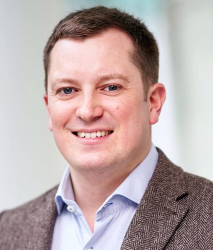AMR Q&A with Dr Jonathan Cox

Could you introduce yourself and tell us a little bit about your research?
I’m Dr Jonathan Cox, Associate Professor of Microbiology at Aston University, co-director of the Antibiotic Discovery Accelerator (ABX) Network and co-chair-elect of the Impact and Influence Committee of the Microbiology Society. For the last decade I have been working to better understand and develop new strategies to overcome the extensive antibiotic resistance we find in pathogens of the Mycobacterial genus. Mycobacteria have been a leading contributor to human disease for thousands of years and even with approaching a century of antibiotic research and development behind us, they remain the leading cause of death due to a single infectious agent. My career aim is to produce more effective treatments that ultimately reduce the global burden of these infectious diseases.
What motivated you to pursue a career in antimicrobial resistance research?
As an undergraduate student in medical biochemistry at University of Birmingham, I became fascinated by the mechanisms of antibiotic action and the machinery bacteria employ to resist them. During my final year, my father developed sepsis with what turned out to be an ESBL-producing Escherichia coli strain, which very nearly killed him. Thankfully, he recovered, but following the experience, I soon developed the aspiration to pursue doctoral research in aiding the discovery effort of new antibiotics to overcome antimicrobial resistance. As part of my PhD, I got to discover the mechanisms of action of newly unearthed antibiotic compounds developed by GSK, and this included detailed evaluation of molecules in complex with their target through x-ray crystallography. With every late night spent at Diamond Light Source in Oxfordshire, watching diffraction data appear on a computer screen, knowing that we would soon see our inhibitors in complex with their target, my passion for finding solutions to AMR grew ever stronger. There have been and continue to be many career challenges, and I still feel the same imposter syndrome I felt as a PhD student, but my excitement for new data, and my passion for meaningful research with the potential to save lives continues to drive me forward.
What are some of the challenges we face with antimicrobial resistance?
I would say the biggest challenge with AMR at the microbiological level is the dynamic nature of the problem. Our microbial enemies are constantly evolving new survival strategies against our best weapons. We also don’t want to kill off all the microbes, just the ones that are causing our infections. So, we need magic bullets that can defeat the invisible enemy without the risk of friendly fire. And, just to complicate matters further, often our life-threatening infections are caused by friendly bacteria that have gotten into the wrong place within the body. It’s a very tall order, but we are rising to the challenge in antibiotic discovery research.
In a political context, the biggest challenge with AMR is that it’s a global problem without a global strategy. To effectively tackle AMR, the world needs to work together to agree universal policy that protects our new drugs and limits the evolution and spread of AMR.
And then the final massive challenge is an economic one. We have shown in recent years what can be achieved with appropriate funding in terms of the global fight against Covid, but who is going to pay to fix AMR? Antibiotics don’t make money. In fact, they are normally a loss-leader, so big pharma don’t want to invest in antibiotic research and development. We need to change the antibiotic business model to make finding solutions financially viable. I believe that when it comes to AMR, if you fix the economics you fix the problem.
Why is your research into potential solutions to the AMR crisis important?
My research is just a small part of the AMR jigsaw. If we don’t discover new antibiotics with novel mechanisms of action that can overcome the current means by which bacteria resist antibiotics, we will soon run out of effective treatments for basic bacterial infections. My team find new small molecule inhibitors that have the potential to become the antibiotics of the future, but ours is not the only strategy. There is some amazing research going on with antimicrobial peptides, bacteriophages, and even predatory bacteria that may also help to stem the tide of AMR. Microbes won’t stop evolving, so neither can our research.
Why is it important to get involved with societies like us when tackling big problems like antimicrobial resistance?
As mentioned, this is a universal problem, so involvement with an organisation like the Microbiology Society, that brings researchers of all disciplines aligned to microbiology together is essential. The Microbiology Society can help to champion initiatives for change, and bring together the different sectors that need to work together to find the solutions to AMR.
What advice would you give an early career microbiologist wanting to work on solutions to the antimicrobial resistance crisis?
Find a supportive PhD supervisor that nurtures your creativity. In terms of your research ideas, take risks, think outside the box, be bold, be collaborative and have confidence in your innovation and curiosity. We need big thinkers to solve big problems, and there is no bigger problem facing microbiologists (and probably the world) than tackling AMR.
If you are interested in opportunities for organisations to collaborate with the Microbiology Society's Knocking out AMR prioject, please email [email protected].
Find out more about the priority solutions and objectives on our website.
Image: iStock/Inventori
